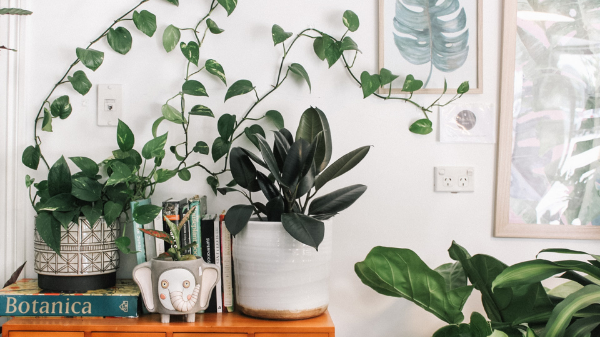
Green thumb success: How not to kill your plants!
When COVID-19 lockdowns started around the world, some people adopted a pet to fill the social void. Other’s got a houseplant. Or four. Or 70! No, seriously. Scroll through Instagram and you’ll notice that plants are so trendy right now. Dense snake plants to lush monstera, cute little pileas or whimsical vines – gardening has become the latest form of self-care during the peak COVID-period and plants, the newest decorating trend. And not just for aesthetic value, there are a variety of reasons to add a splash of green in every room of your house – they purify air, lessen the toxin content, some have aromatherapy benefits and are a such a visual and visceral treat.
If constant love and care is something you’re incapable of, yellowed, drooping leaves, sickened roots are downright daunting and you’re guilty of constant planticide, then allow us to draw an in-depth guide to guarantee a green thumb. And remember, houseplants thrive on a calculated regime of neglect and minimal intervention.
1. Choose your plant and pot wisely

Keeping a living creature alive is no mean feat. Get acquainted with the sunlight condition at your apartment and purchase plants accordingly. If your home is not blessed with the rays (or straight-up gothic?) look for plants that thrive in arid conditions and shade. Knowing the environment on offer is the first step to keeping those beautiful greens alive for years.
Purchasing pots according to the watering needs of the plant is equally important. Plants which require excessive moisture will grow better in plastic pots. The porous nature of the clay pots are apt if you are a nervous waterer. Depending on the size of the plant and how much you want it to grow, buy a planter in between six and 18 inches – that’s ample amount of space for the roots to dig in.
2. The top cause of plant death is overwatering

Stick your fingers in the soil unto the second knuckle – if it’s damp then wait for a day before watering. Dry and powdery sand means it’s time to give some liquid therapy. Research the plants and the care regimen they require, but as a rule of thumb, lush foliage drinks up more water than let’s say, cacti – especially in growth season. The best time to water your greens is between six to 10 am when evaporation is low, so the soil stays damp for longer. How much and how often you water the plants depends upon a lot of external factors – humidity, sunlight, type of plant and pot – but the solution remains the same, check the soil to see if it’s dry.
Top tip: Underwatering doesn’t kill plants as much as overwatering but never wait for the leaves to wilt, that causes plant stress and impacts growth.
3. Positioning and rotating matters

Plants love sunshine, assign your most sun-loving plant near a south-facing window for maximum rays. Winters are tricky for houseplants, with less natural light and shorter days, you will have to constantly rotate the position of your plants near the sunniest, most generous window to keep them nourished and thriving. Rotation and re-positioning happens to be one of the most overlooked techniques when it is especially critical for all-round growth. Unless you’re the awkward lopsided plant-lover?
4. One bad leaf can spoil the bunch!

Like your kids, your plants need the occasional haircut too. Chop the yellow branches, dead flowers, wipe the leaves from time-to-time so that there is no filter between the leaf tissue and sunlight, check the soil for unwelcome guests – pesky bugs, mildew, grey mould, rotten roots, spider mites. No matter how committed a gardener you are, bugs can cause immense damage, you will have to rely on a pesticide spray (store-brought or natural, like neem oil), to keep the soil healthy. If the houseplant looks severely diseased, try pruning the affected area and replant. Mushy, yellow leaves mean that bugs have managed to infiltrate the root and sadly, it cannot be salvaged once root rot sets in.
5. Know thy self, know thy habits
An areca palm might match the tropical vibe at your place but does it match your lifestyle? Do you work 60-hours a week and there is no one at home to share your gardening load? Do you often go for holidays or frequently travel for work? What kind of time and energy are you ready to commit to your green streak? Purchasing plants is easy but before involving your wallet, it’s important to recognize the kind of plant person you are and whether you can handle the commitment of fussy plants. Gardening newbies should stick to what’s termed as the ‘indestructible’ plants – the spider plant, snake plant, ZZ plant, dracaena, pothos amongst others – these species are almost impossible to kill and can withstand a lot of neglect and poor conditions.
Tips:
- Plants detest sitting near a very hot or very cold spot – next to a radiator or a window on a chilly night is not the ideal place for their growth.
- Dampness-loving ferns make for excellent bathroom plants.
- Invest in a digital thermometer for an accurate reading of humidity and temperature if you’re undecided on which part of the house to keep your plants.
-
Coffee grinds, vegetable peels, citrus rinds make for fantastic organic snacks for the plants. Best part, there is no funky smell involved and plants thrive on natural composts.
- Self-watering planters or automatic drip irrigation kits are essential if your lifestyle involves a lot of travel or you are generally careless with your plants. Again, know thy self, know thy habits.
Also Read: Stores for the Best Outdoor Furniture in Hong Kong







